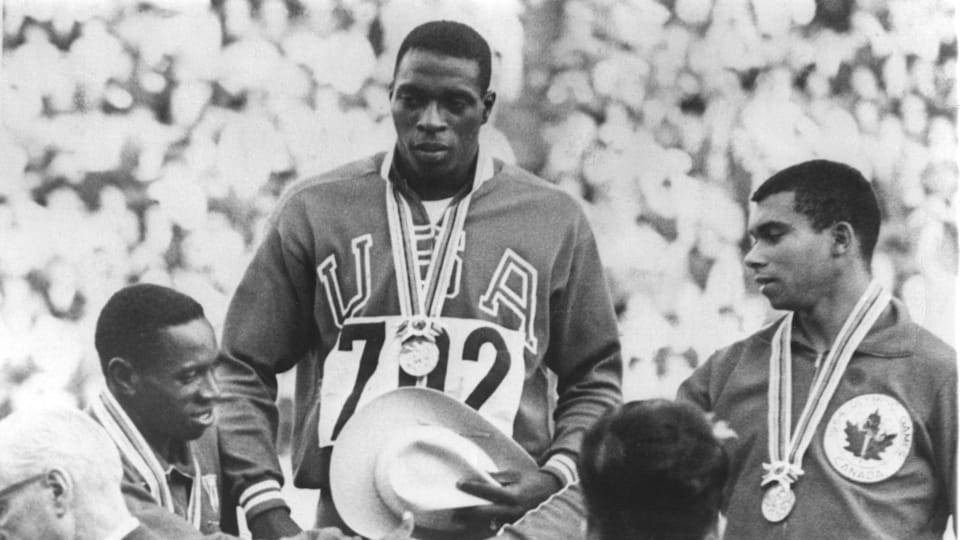How 'Bullet' Bob Hayes became the only man to win Olympic gold and NFL Super Bowl glory
The American was 'The World's Fastest Human' after his two gold medals at the Tokyo 1964 Olympics, then won a Super Bowl championship ring with NFL's Dallas Cowboys

Robert 'Bullet Bob' Hayes is the only man in history to win Olympic gold and an NFL Super Bowl championship title.
The story began on 15th October 1964.
The USA speedster showed up at the Tokyo Games and won 100m gold, running in borrowed spikes in an inside lane chewed up by the start of the men's 20km walk.
He equalled the world record of 10.06 seconds in the process.
Even more legendary was his anchor leg hours later to win Olympic 4x100m relay gold.
USA were lagging behind in fifth place with at least two metres to make up on the rest of the field when Hayes took the baton.
He was more than three metres clear at the finish line, his 100m hand-timed at between 8.5 and 8.9 seconds which remains the fastest relay leg in athletics history.
The team time of 39.06 seconds was also a new world record.
After Hayes' death in 2002, the New York Times called it "perhaps the most memorable 100m in track and field history".
It's part of Olympic lore that France's anchorman Jocelyn Delecour reportedly told USA lead-off runner Paul Drayton, "You can't win, all you have is Bob Hayes."
Afterwards, Drayton is said to have replied, "That’s all we need, pal."
Bullet Bob Hayes in the NFL: "Fast beyond belief"
Sadly for track fans, that relay was Hayes' last Olympic race as he made a permanent switch to American football aged 21.
The Jacksonville native had juggled the two sports successfully while at Florida A&M University and was picked by the Dallas Cowboys in the seventh round of the 1964 NFL Draft, held in December 1963.
He joined up with the Cowboys ahead of the 1965 regular season and left his new team-mates open-mouthed in training camp at his raw pace.
“It was like he was melting, he was so fast,” fellow receiver Frank Clarke told ESPN in 2002.
"Scary," was the view of Gil Brandt, the Cowboys director of player personnel at the time. "The speed he had was… well, frankly, it was beyond belief."
The Olympics' loss was the NFL's gain as cornerbacks were left trailing in Hayes' wake.
He was almost unstoppable as a wide receiver and kick returner, making the Pro Bowl in his first three seasons before opponents switched from man-to-man to zonal defenses to try and deal with him.
According to the Dallas Cowboys official site, "To this day, Hayes holds 10 regular-season receiving records, four punt return records and 22 overall franchise marks, making him one of the greatest receivers to ever play for the Dallas Cowboys."
Hayes was also part of the Cowboys' first ever NFL champion side at the end of the 1971 season, making two receptions as they beat Miami 24-3 in Super Bowl VI.
Game changer
But speed alone isn't enough, and Hayes had the sporting intelligence to be able to use that speed to devastating effect.
"He changed the game because of his speed," Hall of Fame coach Don Shula, who was in charge of the losing side in Super Bowl VI, explained.
"He wasn't just the world's fastest human, he was a great athlete and football player. Put that together, and he made you change everything on your defense when you played the Cowboys."
In a packed highlight reel, one touchdown at Yankee Stadium stands out for those lucky enough to remember it: quarterback Roger Staubach threw a 20-yard (metre) pass to Hayes that he turned into an 85-yard touchdown.
New York Giants defensive back Spider Lockhart - a future two-time Pro Bowler - was right with him when he caught it, but 65 yards later Hayes had put 10 yards between himself and his pursuer.
"It was very exciting having him in the offense," Staubach said. "He had the great speed, and he knew what to do with it."
Former Cowboys team-mate and NFL coach Mike Ditka said, "He redefined what the position was all about."
Hayes left the Cowboys for the San Francisco 49ers in 1975 but was cut within months after failing to show his former spark.
He failed to handle life after sport and was jailed for selling cocaine in 1979.
'Bullet' Bob Hayes died on 19 September 2002 in his hometown of Jacksonville after a long battle with prostate cancer and liver ailments.
But the two-time Olympic champion and Super Bowl winning NFL Hall of Famer will long be remembered as a man who left an indelible mark on two sports.
